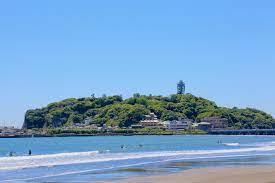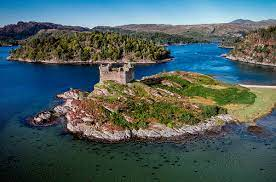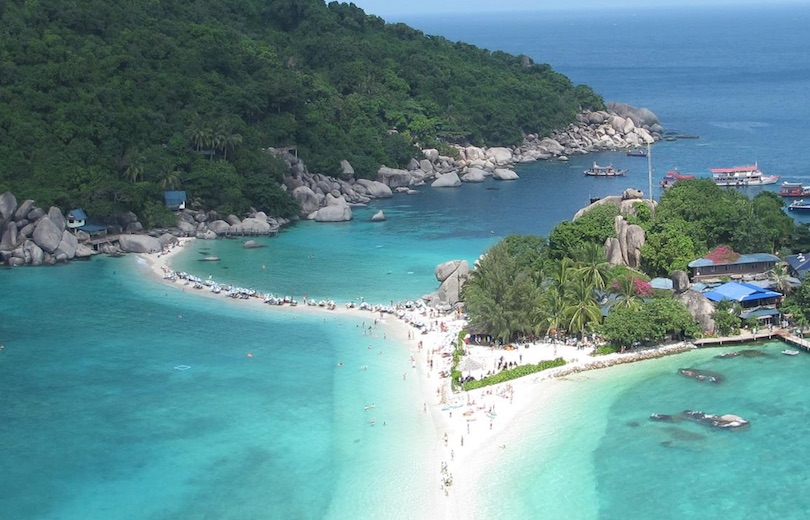
A tidal island is a piece of land that is connected to the mainland at low tide at which time they can be reached on foot. At high tide however it is completely cut off from the mainland and becomes a real island. Tidal islands are sometimes connected to the mainland by a man-made causeway allowing easy access for visitors wishing to cross over but even these can get submerged by the sea. So always check the tide times before you visit, or get ready to swim back.
10. Enoshima
Enoshima is a small tidal island, about 4 km in circumference, at the mouth of the Katase River, which flows into Sagami Bay in Japan. Part of the city of Fujisawa, it is linked to the the mainland by a 600 meter-long bridge and during low tide you can walk to the island on the exposed sandbars. Adjacent to the closest beach to Tokyo and Yokohama, the island and the nearby coast are the hub of a popular resort area. A major attraction on the island is the botanical garden, which was developed by a British merchant in 1880 and attracts over half a million visitors a year.
9. Castle Tioram
Castle Tioram is a ruined castle that sits on the tidal island Eilean Tioram in Loch Moidart, Scotland. Though hidden from the sea, the castle controls access to Loch Shiel. The curtain wall is believed to date from the 13th century while the tower and other interior buildings were constructed between the 15th and 17th century. The castle can be reached on foot across the tidal causeway, but there is no access to the interior because of the risk of falling masonry.
8. Lindisfarne
Lindisfarne is a tidal island off the north-east coast of England also known as Holy Island. Around 635 AD a monastery was founded on Lindisfarne which became the base for Christian evangelising in the North of England. In 793, a Viking raid on Lindisfarne caused much consternation throughout the Christian west, and is now often taken as the beginning of the Viking Age. A small castle was built here in the 16th century. Today the island is a popular tourist attraction. Visitors wishing to walk between the mainland and the island are urged to keep to the marked path, check tide times and weather carefully, and seek local advice if in doubt.
7. Ko Nang Yuan
Ko Nang Yuan is a small island situated off the northwest coast of Ko Tao. The beautiful island is formed by three separate rocky outcrops interconnected by a long sandy beach. At high tides most of the beach gets submerged, creating three separate tidal islands. Just 10 meters from the shore, the coral reefs and marine life are clearly visible in the transparent blue seas. The island is popular with day trippers. There is also one resort located on the middle island with a full range of facilities.
6. Haji Ali Dargah
The Haji Ali Dargah is a mosque located on an islet off the coast of Mumbai. An exquisite example of Indian Islamic architecture, the dargah contains the tomb of Sayed Peer Haji Ali Shah Bukhari. The Haji Ali Dargah was constructed in 1431 by a rich Muslim merchant, who gave up all his worldly possessions before making a pilgrimage to Mecca. The islet is linked to the city by a narrow causeway, which is nearly a kilometer long. As the causeway gets submerged during the high tides the dargah is accessible only during low tide. This walk on the causeway, with the sea on both sides, is one of the highlights of a trip to the shrine.
5. St Michael’s Mount
St Michael’s Mount is a tidal island located 366 meters off the Mount’s Bay coast of Cornwall, in south-western England. It is united with the mainland by a man-made causeway, passable only at mid to low tide, made of granite setts. The chapel of St Michael, a 15th century building, has an embattled tower, in one angle of which is a small turret, which served for the guidance of ships. Some studies indicate that any rise in ocean waters as well as existing natural erosion would put some of the Cornwall coast at risk, including St. Michael’s Mount.
4. Jindo and Modo
Jindo and Modo are two islands located in the southwest of South Korea. Two times a year a natural causeway opens due to extremely low tides, connecting the islands for a period of one hour. The causeway is almost 3 kilometers long, and over 40 meters wide. A festival (the Jindo Sea-parting festival or Jindo Moses Miracle) is dedicated to this natural wonder and people from all around the world attend every year. On each of these days, visitors and tourists from each island traditionally walk to the middle of the causeway to meet one another and celebrate.
3. Eilean Donan
Eilean Donan is a small tidal island in Loch Duich in the western Highlands of Scotland. It is connected to the mainland by a footbridge and lies about half a mile from the village of Dornie. The island is dominated by a picturesque medieval castle. The original castle was built in the early 13th century as a defense against the Vikings. Today, the castle is one of the most photographed attractions in Scotland and a popular venue for weddings and film locations. It has appeared in such films as Highlander and The World Is Not Enough.
2. Sveti Stefan
Sveti Stefan is a seaside resort in western Montenegro, on the Budva Riviera. In the 15th century the island was a small fishermen’s village. In the 1950s the last residents of the village were evicted, and Sveti Stefan was transformed into a luxury town-hotel. The streets, walls, roofs and facades of the buildings were preserved, while the interior of the building were transformed to offer the most modern luxury hotel comfort. Among its guests were Marilyn Monroe, Sophia Loren, Kirk Douglas and Claudia Schiffer. It fell into decline during the breakup of the former Yugoslav federation. In 2007 a Singapore based luxury resort operator won a contract to lease Sveti Stefan for a 30 year period. The island was subsequently closed and extensive renovations began with plans to re-open in 2009.
1. Mont Saint-Michel
Mont Saint Michel is a small tidal island located just off the coast of the northern French region of Normandy. The island is best known as the site of the spectacular and well-preserved Norman Benedictine Abbey of St Michel at the peak of the rocky island, surrounded by the winding streets and convoluted architecture of the medieval town. In 1067, the monastery of Mont-Saint-Michel gave its support to duke William of Normandy in his claim to the throne of England. It was rewarded with properties and grounds on the English side of the Channel, including a small island, which, modeled after the Mount, became a Norman priory named St Michael’s Mount. With tides that can vary greatly the mount can still pose dangers for visitors who avoid the causeway and attempt the hazardous walk across the sands from the neighboring coast.










No comments:
Post a Comment